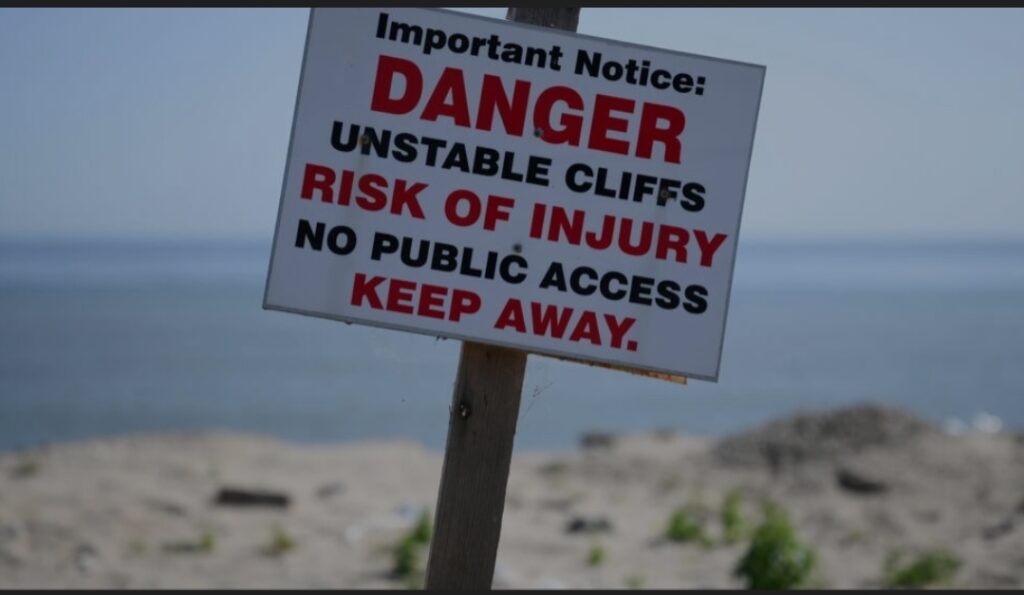
Kevin Jordan thought he would spend his retirement listening to the sound of the sea at his home on the Norfolk coast in eastern England.
But his dream collapsed in November last year and he lost everything overnight when the house was demolished due to coastal erosion.
Now the former engineer is part of a landmark legal case brought by climate activist group Friends of the Earth, accusing the government of not doing enough to protect people from the foreseeable effects of climate change.
Perched on a fragile cliff of sand and clay, Jordan’s house was like dozens of others overlooking the seaside resort of Hemsby Beach, around eight miles (13 kilometres) north of Great Yarmouth.
Until a few months ago, a road led to his front door.
But the tarmac now disappears into thin air and an orange barrier prevents anyone from trying to go further.
“Last November there was a storm… it really caught us by surprise how it became so fierce during the evening through the night,” Jordan, 71, told AFP.
The next day, residents found part of the road washed away, and the coastline had crept closer, leaving Jordan’s house teetering on the edge.
Lashed by storms
According to a report submitted to the Norfolk council in February, the local coastline, which stretches over 150 kilometres, is one of the worst places affected by erosion in northwest Europe.
It predicted a rise in sea levels of 1.15 metres (3.8 feet) by the end of the century, and if nothing is done nearly 1,000 homes and businesses will have disappeared by 2105.
Jordan, an electrician specialising in submarines, bought the house overlooking the North Sea after losing his partner 15 years ago.
He was well aware of the risk of erosion but experts at the time said he would not have to worry about that for at least 100 years.
After the storm, Jordan and four neighbours received a letter telling them to move, because their homes would be demolished within a week.
No compensation was offered and the only solution was for Jordan, who is in poor health, to move to social housing a few kilometres away.
From his window, he can now see only concrete buildings.
“Here before that was just sea, I didn’t have any curtains, I could see passing ships at night with their lights… it was fabulous,” he said.
In 2020, the Marine Climate Change Impacts Partnership estimated that 28 percent of the coastline in England and Wales was retreating by at least 10 centimetres (four inches) a year due to erosion.
The problem is accelerating because of global warming, as higher temperatures mean a rise in sea levels and an increase in storms both in winter and the summer months.
‘Ghost town’
Tourists triple Hemsby’s population of about 4,000 in the summer, but locals say their fate is not a priority for the local authorities.
“Why are they not looking after us?” said Lorna Bevan, owner of The Lacon Arms pub. “People say, ‘It’s just something you should have thought (about)’.”
“But there’s no way anybody could have anticipated these losses 15, even 10 years ago.”
The pub has become the headquarters of the “Save Hemsby Coastline” group and displays a map from 1977 with about 100 houses already crossed out.
Bevan and a tight-knit group of locals are fighting to change the way in which the government allocates funding to build sea defences.
Hemsby is not entitled to any money because the overall value of its businesses and houses does not meet the threshold.
Jordan will be at the High Court in London on Tuesday and Wednesday, with Friends of the Earth arguing that the UK’s climate adaptation plan does not go far enough to protect people affected.
He says the court action is for Hemsby and other places like it.
“The minute you don’t have the beach resorts and shops anymore, everything will be dead. Hemsby will become a ghost town,” he said.
KOIKI Media bringing the world 🌎 closer to your door step
